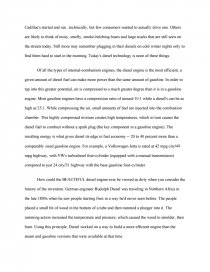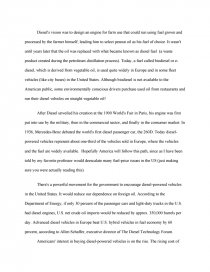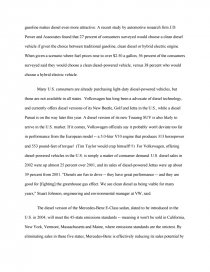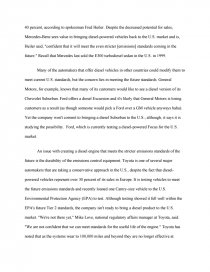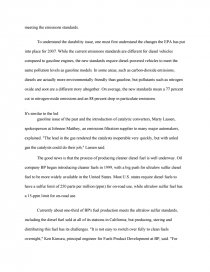Diesels
Essay by review • December 30, 2010 • Essay • 2,198 Words (9 Pages) • 1,229 Views
Diesel, once long ignored, has worked its way out of the trenches and has made it to the forefront. Diesel has been transformed from a gross, smelly mess into a serious contender in the industry.
The change from a mere acquaintance to a well known technology was not an easy one, but diesel may soon have many followers. Today's diesel engines provide 20 to 40 percent better fuel economy, and offer more torque at lower rpm when compared to their gasoline counterparts. Diesel engines are also substantially less harmful to the environment today than they were in the past -- and are headed down the road to becoming even cleaner in the near future. Because the diesel engine is so efficient, it offers better fuel economy, a key component to reducing U.S dependence on foreign oil.
While the number of diesel-powered models is not immense, it does represent a wide cross-section of vehicle segments and price ranges. For the 2003 model year, there are nine cars and trucks available in the U.S. with diesel engines; ranging in size from the Volkswagen Golf to the Ford Excursion. On the way are diesel-powered versions of the Volkswagen Passat, Jeep Liberty and, most likely, the Volkswagen Touareg for the 2004 model year, and a Mercedes-Benz E-Class sedan as a 2005 model. While some automakers don't have plans to offer diesel-powered vehicles just yet, all of the major manufacturers are taking a serious look at the technology. You can bet that they will be watching carefully to see how the above mentioned vehicles are accepted in the U.S. market.
One of the biggest hurdles for diesel to overcome was its bad reputation with the American consumer. "Baby Boomers" remember the fuel crises of the 1970s, and the failed attempt by General Motors to offer diesel drive trains. Oh sure, the various diesel-powered Cadillac's started and ran...technically; but few consumers wanted to actually drive one. Others are likely to think of noisy, smelly, smoke-belching buses and large trucks that are still seen on the streets today. Still more may remember plugging in their diesels on cold winter nights only to find them hard to start in the morning. Today's diesel technology is none of these things.
Of all the types of internal-combustion engines, the diesel engine is the most efficient; a given amount of diesel fuel can make more power than the same amount of gasoline. In order to tap into this greater potential, air is compressed to a much greater degree than it is in a gasoline engine. Most gasoline engines have a compression ratio of around 10:1 while a diesel's can be as high as 25:1. While compressing the air, small amounts of fuel are injected into the combustion chamber. This highly compressed mixture creates high temperatures, which in turn causes the diesel fuel to combust without a spark plug (the key component in a gasoline engine). The resulting energy is what gives diesel its edge in fuel economy -- 20 to 40 percent more than a comparably sized gasoline engine. For example, a Volkswagen Jetta is rated at 42 mpg city/49 mpg highway, with VW's turbodiesel four-cylinder (equipped with a manual transmission) compared to just 24 city/31 highway with the base gasoline four-cylinder.
How could the BEAUTIFUL diesel engine ever be viewed as dirty when you consider the history of the invention. German engineer Rudolph Diesel was traveling in Northern Africa in the late 1800s when he saw people starting fires in a way he'd never seen before. The people placed a small bit of wood in the bottom of a tube and then rammed a plunger into it. The ramming action increased the temperature and pressure, which caused the wood to smolder, then burn. Using this principle, Diesel worked on a way to build a more efficient engine than the steam and gasoline versions that were available at that time.
Diesel's vision was to design an engine for farm use that could run using fuel grown and processed by the farmer himself; leading him to select peanut oil as his fuel of choice. It wasn't until years later that the oil was replaced with what became known as diesel fuel (a waste product created during the petroleum distillation process). Today, a fuel called biodiesel or e-diesel, which is derived from vegetable oil, is used quite widely in Europe and in some fleet vehicles (like city buses) in the United States. Although biodiesel is not available to the American public, some environmentally conscious drivers purchase used oil from restaurants and run their diesel vehicles on straight vegetable oil!
After Diesel unveiled his creation at the 1900 World's Fair in Paris, his engine was first put into use by the military, then in the commercial sector, and finally in the consumer market. In 1936, Mercedes-Benz debuted the world's first diesel passenger car, the 260D. Today diesel-powered vehicles represent about one-third of the vehicles sold in Europe, where the vehicles and the fuel are widely available. Hopefully America will follow this path, since as I have been told by my favorite professor would deescalate many fuel-price issues in the US (just making sure you were actually reading this).
There's a powerful movement for the government to encourage diesel-powered vehicles in the United States. It would reduce our dependence on foreign oil. According to the Department of Energy, if only 30 percent of the passenger cars and light-duty trucks in the U.S. had diesel engines, U.S. net crude oil imports would be reduced by approx. 350,000 barrels per day. Advanced diesel vehicles in Europe beat U.S. hybrid vehicles in fuel economy by 60 percent, according to Allen Schaffer, executive director of The Diesel Technology Forum.
Americans' interest in buying diesel-powered vehicles is on the rise. The rising cost of gasoline makes diesel even more attractive. A recent study by automotive research firm J.D. Power and Associates found that 27 percent of consumers surveyed would choose a clean diesel vehicle if given the choice between traditional gasoline, clean diesel or hybrid electric engine. When given a scenario where fuel prices rose to over $2.50 a gallon, 56 percent of the consumers surveyed said they would choose a clean diesel-powered vehicle, versus 38 percent who would choose a hybrid electric vehicle.
Many U.S. consumers are already purchasing light-duty diesel-powered vehicles, but those are not available in all states. Volkswagen has long been a advocate of diesel technology, and currently offers diesel versions of its New Beetle, Golf and Jetta in the U.S., while a diesel Passat is on the way later this year. A diesel version of its new Touareg SUV is also likely
...
...

